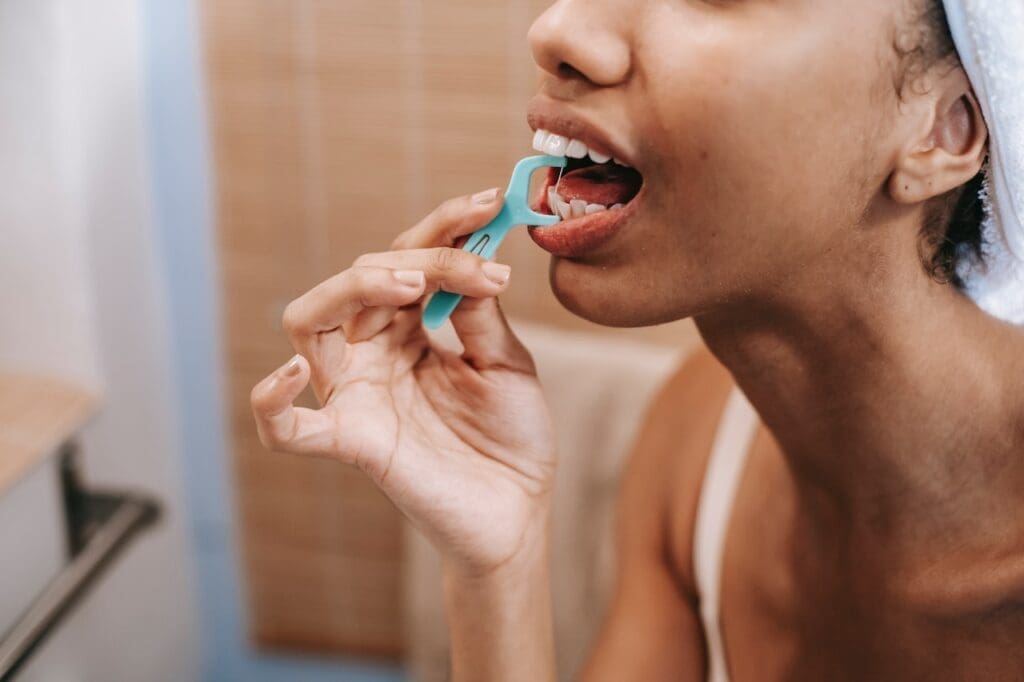Regular flossing is a must for good oral hygiene. Plaque builds up between your teeth and gum line if you don’t floss. This may eventually make you more susceptible to gum disease and tooth decay.
The American Dental Association advises using interdental cleaners like floss to remove plaque and debris from hard-to-reach places.
Learn more about the advantages of flossing and how often and when to do it by reading on. For interdental cleaning, we’ve covered you if you’re seeking alternatives to dental floss.
1. Gets Rid of Plaque Buildup
An invisible, adhesive film called plaque builds up on, between, and near the gumline. Despite being hard to see, the plaque shouldn’t stay in the mouth long.
Plague forms on and around the teeth when oral bacteria interact with starchy or sugary meals and beverages. These bacteria create acids that break down carbs. A plaque film can develop on and near the teeth and gumline from bacteria, acids, and carbohydrates without brushing.
Over the day, plaque builds up on the teeth. Tartar develops when plaque is not routinely cleared. Plaque’s brittle and obstinate relative is tartar. Without the aid of a dental expert, it is almost hard to remove!
2. Prevents Bacterial Buildup
Remember that your mouth is full of bacteria. Brushing helps remove some of it, but flossing can remove about 40% of the bacteria-covered surface area of your teeth that toothbrushes cannot reach. Bacteria and other microorganisms could get stuck between your teeth, especially if you don’t care for them by eating a nutritious diet and practicing good dental hygiene.
By removing food debris and bacteria from areas that a toothbrush cannot reach, flossing helps prevent microbial colonies’ growth in these areas. The cornerstone of preventative oral care at home is brushing and flossing twice daily.
3. Freshens Breath
Even if you cannot feel food between your teeth, it will eventually accumulate as you eat. When deeply embedded, your toothbrush cannot remove them, so if you don’t floss, they will stay.
The food produces a very repulsive stench as it breaks down. If you’ve ever wondered why you can’t get the fresh breath you want after brushing, the reason is probably that you’re not flossing.
4. Brushing Isn’t Always Enough
As we’ve been saying the entire time, brushing is insufficient.
No matter how often, how long, or how hard you brush, there are some crevices and nooks that toothbrush bristles can’t get into. Contrarily, floss can get between each tooth and remove any food particles or bacteria that have accrued there, leaving your mouth much cleaner.
5. Prevents Gum Disease
The effects of plaque and tartar extend beyond simply making teeth yellow. Your gums may also suffer grave damage from them.
Gum disease can result in tooth decay, root canals, and even tooth loss if it advances to an advanced stage. Anyone could not endure that much suffering and harm, especially when the preventative measure is as easy as flossing.
Conclusion
Flossing teeth has many benefits, including preventing gum disease, removing plaque, and improving oral health. While brushing your teeth is important, flossing is crucial to maintaining good oral hygiene.
If you need a dentist in Melrose to check your oral health and give further professional advice about flossing, Melrose Dental Group is here for you! We firmly believe in educating patients about their oral health and recommending custom dental treatments. Contact us now!

